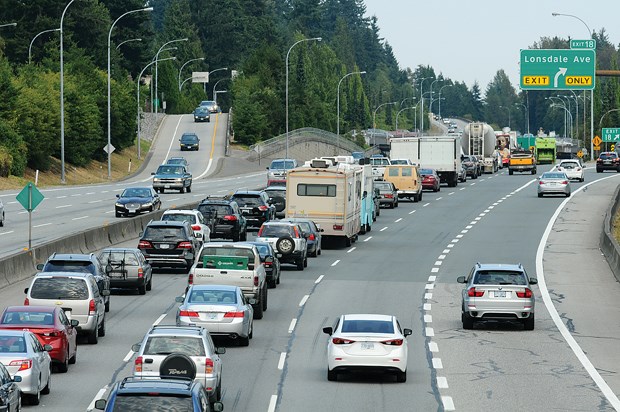North Vancouver mayors are hoping a commission formed to look at ways to cut vehicle congestion and pay for transit will come up with a solution to ease the North Shore’s traffic gridlock sooner than later – even if it means drivers have to pay for it.
“I think people realize congestion is having a very significant impact on the North Shore,” said City of North Vancouver Mayor Darrell Mussatto. “We need to look at everything.”
Mussatto made the comments Tuesday after an announcement from the Mayors’ Council on Regional Transportation and the TransLink board of directors launching a new independent commission that will examine options for mobility pricing in Metro Vancouver. Mobility pricing – a concept advocated by the mayors for years but previously rejected by the provincial government – could mean tolls on bridges or sections of highway or special permit fees for vehicles or extra fuel taxes.
Both Mussatto and District of North Vancouver Mayor Richard Walton acknowledged that asking drivers to pay more in tolls could be a tough sell politically. “Nobody wants to pay for anything they perceive should be within their general taxes to begin with,” said Walton. “The perception is the roads are provided free of charge and it’s the government’s responsibility to provide for them.”
The key to mobility pricing is to make sure it’s fair and that it actually helps to solve the problem of traffic gridlock in a noticeable way “so it doesn’t just tax people without solving the problem,” said Mussatto.
Both mayors said drivers also have to weigh the cost of whatever tolls are eventually recommended with the cost of sitting in traffic for hours.
When he asks people who spend a lot of time stuck in traffic, if they’d be willing to pay $3 to be over one of the North Shore bridges quickly, “Every person I’ve asked this to has said yes,” said Mussatto. “I think there’s lots of ways to look at this.”
Just what options the new commission will recommend – and how various levels of government will react to those – won’t be known for at least another year. Chaired by Allan Seckel, a former deputy minister and head of the public service, and former NDP Opposition leader and finance minister Joy MacPhail, the 10-member commission will first oversee research into other models of mobility pricing in cities around the world and will consult with the public before coming up with recommendations. The executive director of the new commission, Daniel Firth, previously worked on mobility pricing in Stockholm and London.
Walton said there are similarities and differences between Stockholm and Metro Vancouver. Both cities have similar geographic issues involving bodies of water that can significantly impact the cost of infrastructure, said Walton. But traffic flows in Stockholm tend to be more predictable, he said. That city’s growth was also planned around a transportation system as it expanded. “Here we’re retrofitting a system.”
While the members of the commission haven’t been announced yet, Walton said at least one member is from the North Shore. The NDP, expected to form a minority government soon, campaigned on a promise to get rid of “unfair” bridge tolls in the Lower Mainland. Walton said that creates a challenge, because there is still significant debt to pay off on those bridges. “If you’re going to eliminate those tolls, who will pay? That’s a question that needs to be answered.”
In launching the commission Tuesday, Vancouver Mayor Gregor Robertson said the region needs to come up with a “reasonable approach” to tolling.
North Vancouver-Lonsdale MLA-elect Bowinn Ma said during the election the NDP would work with the mayors to come up with a regional congestion strategy that would likely include some form of road pricing. The Green Party opposed getting rid of current tolls.
The province will have the final say on whether TransLink can go ahead with any form of mobility pricing.



